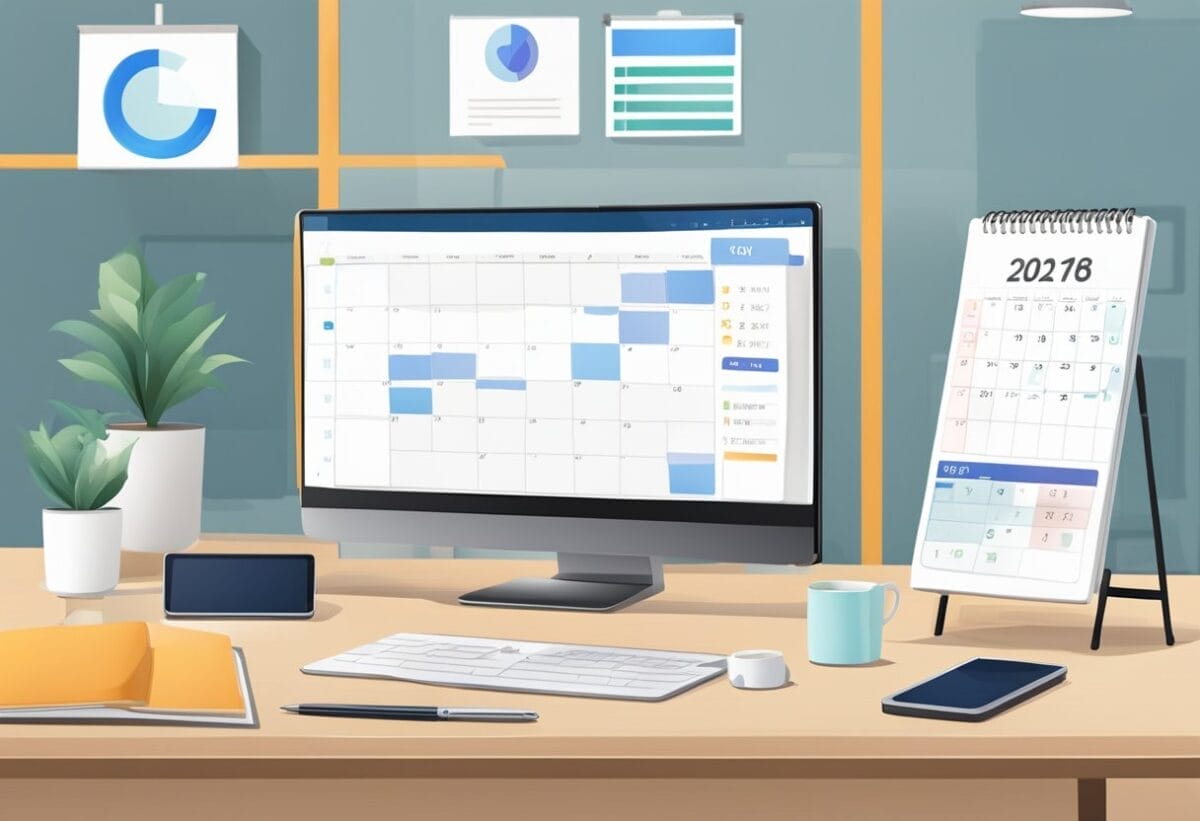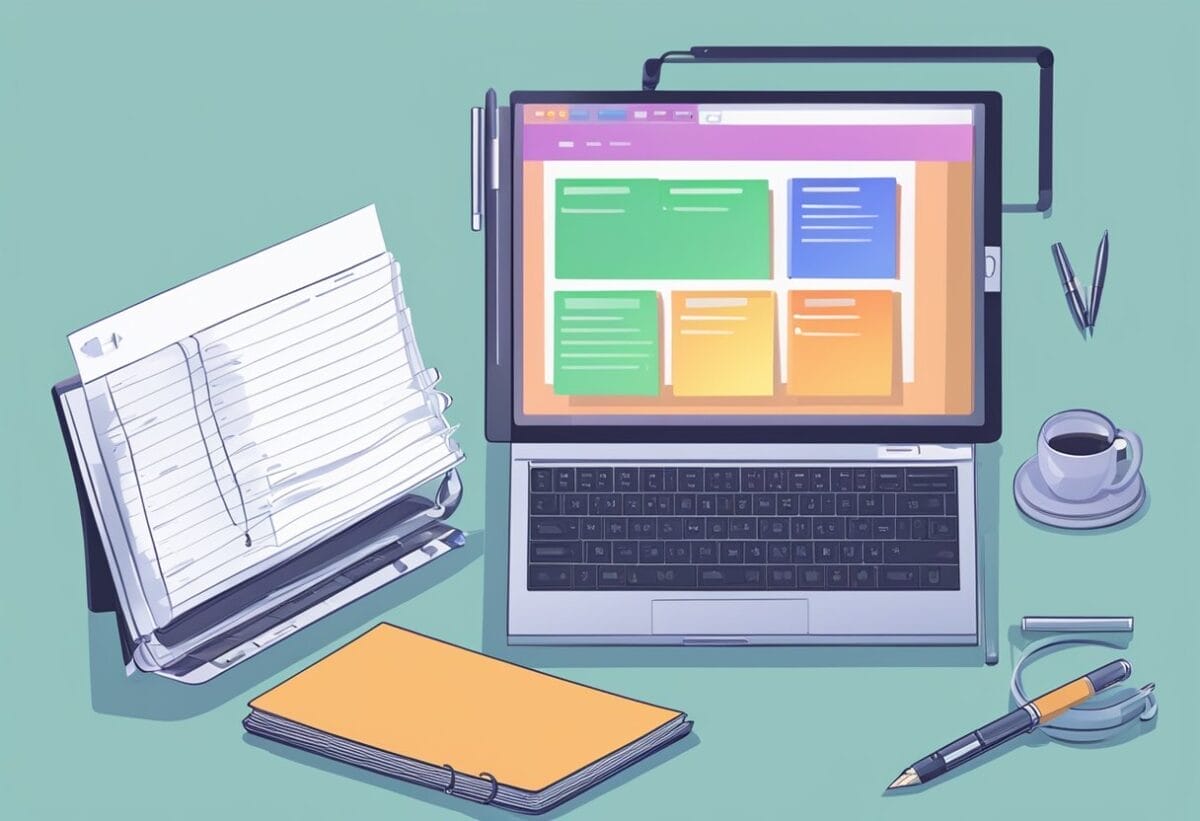Preparing for an online meeting with your boss is an opportunity to showcase your professionalism and commitment to your career. A well-prepared online meeting will mean:
- Demonstration of your enthusiasm for personal and professional development
- Your ability to navigate the digital workplace with confidence.
- Set the stage for a successful interaction, highlighting your diligent preparation.
However, you should approach this discussion with clarity and an open mind, ready to engage in constructive dialogue that can further your collaborative relationship with your boss.
KEY TAKEAWAYS
- Effective preparation sets the tone for a successful online meeting.
- Anticipate the dialogue to communicate clearly and confidently.
- Use the meeting to strengthen your professional relationship with your boss.
Why Will You Have Online Meetings With Your Boss or Manager?
You may want to have an online meeting with your boss or leadership team due to a few reasons:
- Alignment: Establish shared understanding and expectations.
- Feedback: Gain insights to enhance performance.
- Support: Seek guidance and assistance.
- Growth: Discuss progress and set future targets.
- Connection: Strengthen your relationship with management.
Online meetings with your boss or manager serve to enhance collaboration, foster teamwork, align on goals, discuss project updates, and strategize solution to overcome blockers.
These meetings with your boss can help you get to understand the broader company vision beyond your immediate tasks.
How to Prepare Online Meetings With Your Boss or Manager?

Envisioning the meeting ahead of time allows you to strategize responses to possible questions, ensuring you articulate your thoughts effectively.
We are not just talking about the content of the meeting, but also about fostering rapport and trust.
Being prepared for your online meeting is more than technical readiness; it’s about reinforcing your role as a proactive, reliable member of the team.
1. Understanding Your Meeting Objectives Prior to Your Meeting

Before stepping into an online meeting with your boss, clarity on the meeting’s objectives. Ask yourself questions such as:
- “What are the goals you wish to accomplish during this meeting?”
- “What are the priorities that need addressing?”
- “What is this meeting about?”
You need to align your thoughts with the meeting’s agenda and establish what you hope to achieve in this meeting.
Take a moment to jot down the purpose of the conversation.
- “Is it for project updates?”
- “Is it for your performance reviews?”
- “Is it a strategic planning?”
Knowing the objective of your meeting can help you maintain your meeting’s focus.
Prepare, Prepare, Prepare
Break down your objectives into actionable items. Consider what outcomes you envision.
Utilize a simple table to organize your thoughts:
| Agenda Item | Objective | Priority |
|---|---|---|
| Item 1 | Detailed Description | High |
| Item 2 | Detailed Description | Medium |
| Item 3 | Detailed Description | Low |
Having effective meetings are a two-way street. You should also be receptive to your boss’s objectives.
Reflect on any questions your boss might have and prepare your responses. Your preparation shows your commitment and helps you steer the dialogue constructively.
Listen actively and demonstrate your willingness to work towards common goals. Your interactive engagement will pave the way for a successful and productive meeting.
2. Determining Your Online Meeting Agenda

Begin by setting a clear objective for your meeting.
Consider what you aim to achieve and ensure it aligns with your boss’s expectations.
Compile a list of topics you need to discuss. Prioritize them based on urgency and relevance to the meeting’s goal. This approach keeps you focused and makes the best use of the allocated time.
- Identify key points you wish to cover.
- Estimate how much time to allocate for each topic.
- Sequence your agenda logically, allowing a smooth flow from one point to the next.
Your agenda should reflect the purpose and scope of the discussion, providing a blueprint for a productive session.
- Prepare questions in advance to clarify any uncertainties. This reveals your thoughtfulness and helps maintain the meeting’s direction.
- Bold and highlight topics requiring critical attention, as this will guide the conversation to your most important points.
- Lastly, share your agenda with your boss beforehand. This allows them to prepare, making the meeting more effective.
A prepared agenda conveys your professionalism and respect for their time.
3. Prepare for Constructive Dialogue With an Open-Mind

A well-prepared dialogue can transform your online meeting into a pivotal moment for career advancement.
Anchoring the conversation on a foundation of open-mindedness ensures that both feedback and ideas are exchanged positively.
Crafting Key Talking Points
Identify the main points you wish to discuss. Reflect on your personal success and career growth.
Distill these into concise bullet points for clarity. Tie your strengths to specific examples of past accomplishments.
Similarly, pinpoint current challenges and align them with areas for improvement and goal-setting.
- Success: Highlight recent achievements.
- Challenges: Address hurdles and how you’re overcoming them.
- Growth: Emphasize the desire for continued professional development.
Listing Questions and Concerns
Prepare a list of targeted questions to show engagement and thoughtfulness.
Draft questions to ask about potential career paths or feedback on recent projects that demonstrate your commitment to growth.
Next, outline any concerns involving responsibilities or areas for improvement that you wish to discuss.
- Ask about advancement opportunities.
- Seek advice on professional development.
- Voice constructive feedback on office dynamics.
Enter the conversation with an open mind creates a space for constructive dialogue, fostering a positive environment for both you and your boss to share and receive.
4. Strategizing for Possible Questions and Answers

Before your online meeting with your boss, anticipate potential questions.
Reflect on project statuses, milestones, and any obstacles you’ve faced.
Outline your thoughts, ideas, and solutions to present. Being prepared shows foresight and commitment.
| Challenge | Possible Question | Strategic Answer |
|---|---|---|
| Project delay | “What’s causing the delay?” | “We’ve identified the bottleneck, and here’s how we’re planning to address it…” |
| Budget overrun | “Why are we over budget?” | “Several factors contributed, including X and Y. We’re considering the following measures to manage costs…” |
| Low employee morale | “What do you think is contributing to the decrease in morale?” | “There are a few factors at play, such as heavy workload and lack of recognition. We’re implementing initiatives to boost morale, including team-building activities and recognition programs.” |
| Decline in productivity | “Why do you think productivity has decreased?” | “There are several reasons, including inefficient processes and lack of motivation. We’re exploring ways to streamline processes and provide additional support to improve productivity.” |
| High employee turnover | “What do you believe is causing the high turnover rate?” | “There are multiple factors, including limited career growth opportunities and dissatisfaction with company culture. We’re focusing on improving retention through mentorship programs and enhancing our company culture.” |
| Customer complaints | “Why are we receiving an increasing number of customer complaints?” | “There are various reasons, such as product issues and communication gaps. We’re implementing measures to address these concerns, including enhancing product quality and improving communication channels with customers.” |
| Lack of innovation | “How can we encourage more innovation within the team?” | “We believe there’s untapped potential within the team, and we’re exploring ways to foster a culture of innovation, such as dedicated brainstorming sessions and incentivizing creative ideas.” |
Prepare for questions about your work’s impact. Can you quantify success with metrics or statistics? Your ability to communicate this is essential.
- List your achievements: Be concise but specific.
- Mention challenges overcome: This demonstrates problem-solving skills.
Think about questions regarding future plans:
- “What are your next steps?”
- “How will you ensure project completion?”
Your answers should align with your department’s goals and expectations. This helps in fostering trust and confidence in your capabilities.
Always have a solution-oriented mindset.
If you present a problem, also offer a solution.
For example, “We’re slightly behind schedule, but by allocating additional resources, we can get back on track.” This illustrates proactive thinking.
Lastly, practice your responses. Rehearse possible scenarios.
This builds your confidence and makes you appear more polished during the actual meeting.
5. Foster a Collaborative Relationship

When we are working remotely, we need to forge a strong alliance with your boss. Start by developing a relationship of trust that bridges gap and enables growth.
Building Trust
First impressions set the stage for trust.
- During your one-on-one meetings, showcase consistent results and honesty.
- Be open about challenges, seeking feedback not just to hear it, but to act on it.
This openness will signal your commitment and earn your manager’s trust.
Adopt Effective Communication
Communicating well means listening as much as you speak.
- Be concise, yet informative about your achievements and thoughts in your messages.
- When we are talking about online communication, whether via email or video calls, ensure clarity to avoid misunderstandings.
An open, active and positive communication lays the foundation for a supportive workplace.
Seeking Guidance for Career Path
Your boss can be a vital coach in your professional journey. Don’t hesitate to ask questions that can guide your career path.
Gather insights for problem-solving and performance feedback.
When you actively seek guidance, you demonstrate initiative and a desire for growth.
Tips For Effective Online Meeting With Your Boss or Manager

To ensure productive dialogue with your boss, clarity and preparation are your roadmaps. Here’s how you can make the most out of this essential touchpoint.
1. Understand What You’ll Be Discussing With Your Boss and Prepare Accordingly
Ensure you’re aligned on the meeting topics.
Email your boss with the key points you’d like to address.
This sets the stage for a focused and effective discussion.
2. View the Meeting as a Positive Opportunity
Encounter the meeting with optimism.
Whether it concerns performance, pay, or projects, see it as a chance for growth and a way to strengthen your professional relationship.
3. Come Up with Possible Solutions for Each Problem and Challenges
Before the meeting, think about solutions to potential issues.
Showing proactivity with constructive solutions will mark you as an engaged and resourceful team member.
4. Confirm Your Meeting Time and Date the Day Before
A day prior, confirm the meeting schedule.
It’s a simple act that demonstrates your respect for their time and your commitment to the meeting.
5. Ask for Feedback
Utilize this one-on-one time to seek out genuine feedback.
Openly inquire about your recent work or areas for improvement.
6. Don’t be Afraid to Ask Questions
If any topics are unclear during the discussion, don’t hesitate to ask for clarification.
It shows your desire to understand fully and perform well.
7. Send a Follow Up Email and Thank Your Boss or Manager For Their Time
Post-meeting, send a concise email. Recap your discussion points and express your appreciation.
This not only shows gratitude but also emphasizes your commitment to action items discussed.






